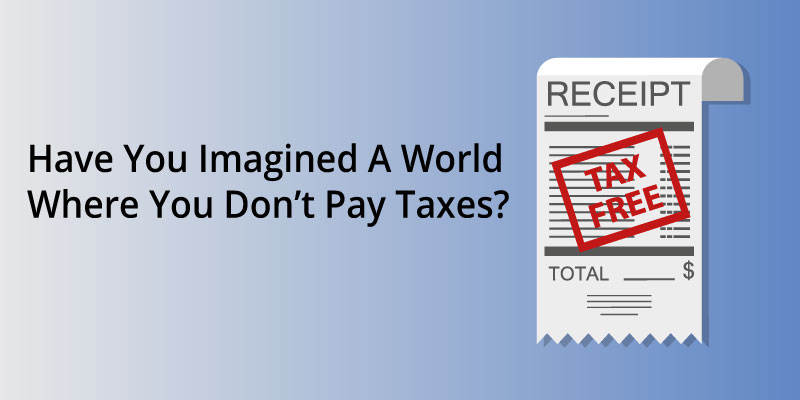Have You Imagined a World Where You Don’t Pay Taxes?
Every year, American individuals and businesses are forced to cough up hard-earned money when tax season rolls around. While this is often one of the most feared and dreaded times of the year for Americans, some are able to walk away unscathed.
If you’ve ever wondered why some people pay fewer taxes than you each year, despite the fact they make more money than you, you’re not alone. This is the confusing reality most people are faced with come tax season.
“The system” is very complex, and no one is arguing that, but that doesn’t mean the wealthy are doing anything wrong by paying less. They know the system well enough to legally use it to their advantage — or at least have a team of professionals working alongside them.
Although we can’t share all the secrets of this in a single post, the team at UBOS would like to take a few moments to help the average American better understand this process.
How Taxes Normally Work
First and foremost, we have to understand how paying taxes normally works. You’re likely familiar with the seven-tier tax bracket system, which determines your tax rate based on the amount of earned income. This is how most people in America will file their taxes.
The tax rates range from 10% to 37% of total earned income and will vary between individuals and couples. As you can only hope, the IRS has it progressively set up, meaning the rich pay more and the poor pay less.
If you’re trying to get around having to pay those taxes, you can take advantage of the two other types of income that are taxed each year — passive income and portfolio income. For the most part, Americans will go their entire life having no idea what these other two incomes are and how they can benefit you come tax season.
Let’s take a look at the difference:

- Earned Income – income that includes wages, salaries, employee compensation, tips, and commissions
- Passive Income – income that comes from a rental property, limited partnership, or affiliate marketing
- Portfolio Income – income received from interest, capital gains, royalties, dividends, and investments
One of the first ways the wealthy — or smart — find a way around taxes is with itemized deductions. Unlike the standard deduction, which most Americans use when filing taxes, itemized deductions allow you to write off certain expenses to lower your taxable income.
That’s not even the money-maker (or money-saver) when it comes to taxes. Where most people find tax relief is in leveraging portfolio and passive income in their favor. To put it simply, earned income is there to build wealth. Portfolio income is there to minimize tax deductions.
Leveraging Capital Losses and Capital Gains
Every time you sell an asset, a taxable event is triggered. There will be several different factors determining how much you’re taxed on that sale, whether it be stock, real estate, bonds, or much more.
A capital gain occurs when the sale price exceeds the purchase price. If a profit is made, it’s considered a capital gain. You will be taxed for this, but it will largely depend on how long you owned the asset.
For anything owned less than one year, your tax rate will be determined by your typical tax bracket. If you’re trying to avoid paying taxes, however, you’ll invest in the long-term because anything owned past one year is subject to a lower tax rate.
In addition to that, you can use capital losses — purchase price exceeds sale price — to balance out capital losses. Let’s say you sell a property for a capital gain of $10,000 but sell another home for a loss of $5,000. You’ll only be taxed for $5,000.
Earning Less vs. Investing More
At the end of the day, working around paying taxes will come down to one of two things — earning less or investing more. With the way the tax system is fabricated, your tax rate will decrease the less you earn. Unfortunately, this won’t be a sustainable way to live a quality life.
With that being said, most people will be inclined to earn more and pay higher taxes. In order to lower those taxes, you have to be smart with the money you make. This is where the 401k, IRA, and HSA can put you in a position for long-term success.
Let’s take a close look at these three:
- 401k – offered by most employers across the US, a 401k is a retirement plan that saves a portion of your earned income as a long-term investment
- IRA – if you don’t have an employer or your employer doesn’t offer a 401k, an IRA will work the same way (for the most part)
- HSA – if you’re enrolled in a high-deductible health plan, an HSA is a type of long-term savings account for medical purposes
What most people aren’t aware of is the fact that all three of these accounts hold one similar trait — they are all tax-advantaged. This means any contributions made to these accounts won’t count towards your taxable income — effectively lowering your tax rates.
As you can see, there are a wide variety of ways to lower your taxable income and tax rates while setting yourself up for a brighter future. Keep in mind there are plenty of “tricks” that haven’t been explained in this post — and the smartest, wealthiest people in the world know how to leverage all of them.
If you want this to be a reality for you, UBOS is ready to help. We’ve helped over 10,000 clients — individuals and businesses — find the tax relief they’ve been searching for. Contact us today to begin your consultation and learn more about how we can help you!


Your Comment
Leave a Reply Now